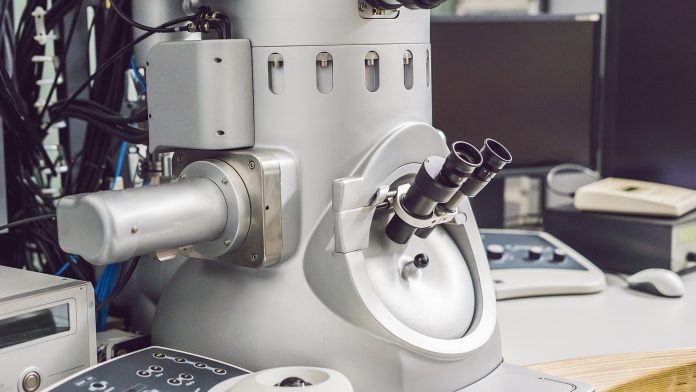Materials scientists from Manchester are developing a Transmission Electron Microscope that integrates cutting-edge imaging and spectroscopy with artificial intelligence and automated workflows.
While Transmission Electron Microscopes can image atomic-scale structure and chemistry, the technique is very time-consuming. This means that the typical regions of interest are very limited.
The new AutomaTEM will resolve this, improving the ability to find and analyse, reducing the time incurred while increasing the ROI.
As a result, it will accelerate innovation in materials applications for quantum computing, low-power electronics, and new catalysts to support the energy transition. These are currently held back by the limitations of today’s technology.
About the AutomaTEM
The new Transmission Electron Microscope is funded through a £9.5m project supported by The University of Manchester, The Henry Royce Institute, BP, and EPSRC, in collaboration with Thermo Fisher Scientific, the manufacturer.
The team, led by Professor Sarah will merge the Transmission Electron Microscope’s existing atomic scale elemental and chemical mapping capabilities with emerging developments in automation and data analysis to create the AutomaTEM.
The new device can acquire huge data sets of local chemical information in days rather than years.
Prof Sarah Haigh, Professor of Materials Characterisation at The University of Manchester and Director of the Electron Microscopy Centre (EMC), said: “Understanding atomic detail at the micrometre or millimetre scale is crucial for developing materials for various applications, from catalysis and quantum technologies to nuclear energy and pharmaceuticals.
“This system is not simply another TEM instrument. It will provide new opportunities for atomic scale investigation of materials with less human intervention. For the first time we will be able to enable atomic resolution analysis of hundreds of regions of interest in a matter of hours, providing unprecedented insights into sparse defects and heterogeneous materials.”
Features of the new device
The new Transmission Electron Microscope is designed with AI and automated workflows at its core. It has several cutting-edge features, including:
- Computer control to adjust the sample stage and beam to address specific regions of interest
- Machine learning integration to segment lower resolution data and build functional relationships between experimental results
- An Energy Dispersive X-ray Spectroscopy system with exception collection efficiency
- A new chemical high-performance electron energy loss spectrometer design for chemical analysis of diverse species in complex systems
It is a custom build device and will arrive in summer 2025.
Thermo Fisher Scientific has provided the team access to the necessary API control and will supply an EDS system with a world-leading collection efficiency of 4.5 srad.
The AutomaTEM will be available to external users
AutomaTEM will find its home in The University of Manchester’s Electron Microscopy Centre (EMC), renowned for its state-of-the-art facilities.
The EMC, one of the largest in the UK, is already equipped with six transmission electron microscopes (TEMs), 13 scanning electron microscopes (SEMs), and six focused ion beam (FIB) instruments.
Serving over 500 internal users from 12 different UoM Departments, the EMC also hosts researchers from institutes worldwide.
During the first three years, AutomaTEM will be available to external users for free proof-of-principle academic projects, up to 30% of its total use.
Dr Alexander Eggeman, Royal Society University Research Fellow at The University of Manchester, who is leading co-investigator on the project, said: “The faster, more accurate analysis capabilities of AutomaTEM represent a significant leap forward in materials science research.
“With the potential to impact various industries, including aerospace, automotive, and semiconductor, the AutomaTEM aims to support the UK’s position at the forefront of materials science innovation.









